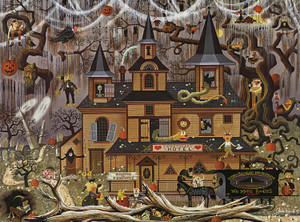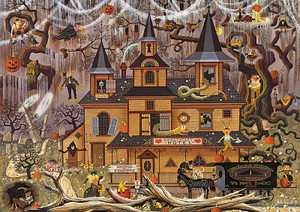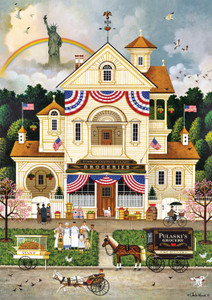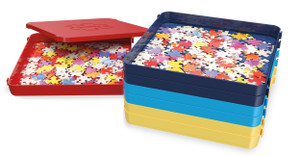Posted by Buffalo Games on Aug 2nd 2022
Can Solving Jigsaw Puzzles Increase My IQ?
There’s a popular rumor making the rounds that solving jigsaw puzzles boosts your IQ. While this sounds good, it’s worthwhile to investigate what IQ is, why it’s important, what it measures, and how solving jigsaw puzzles on a regular basis can help.
What Is IQ?
IQ stands for intelligence quotient, and it was a term first coined by German scientists in the late 1800s looking for a way to standardize and measure human intelligence.
Early iterations of IQ testing had to do with measurements of the speed and accuracy of a given subject’s perception. It wasn’t until the early 1900s, about the time the modern jigsaw puzzle made its debut, that the modern IQ test began to take shape.
Alfred Binet was interested in being able to place children of different abilities into the proper educational setting so that they could succeed. He based a lot of his work on what a subject was able to accomplish academically relative to their peer group, which is an important detail to remember as we explore the importance of IQ.
Why Is IQ Important?
If, when we mention IQ, you’re picturing Frazier Crane — the rather uppity and self-deluded character from the sitcom by the same name — you’re not far from how most people view those who talk about their IQ. It seems many of us think it’s a bit gauche to parade how smart we are relative to others.
If someone can solve a 2000-piece puzzle by themselves in five minutes, hooray for them. Most people don’t think of a 500-piece puzzle as a race or contest because IQ isn’t about whether we’ll be admitted to an Ivy League school, for instance.
For most people, improving our IQ as mature adults is more about whether we’ll have to suffer through early-onset dementia or Alzheimer’s.
IQ is important because it’s a continuously moving evaluation of cognitive health relative to our age group. If a ten-year-old kid can do what most ten-year-olds can do, he’s on par or has an IQ of 100. If that same kid can do what most twelve-year-olds can do, he’s performing above the mean for his peer group, so he’ll score higher. Increasing IQ simply means we’re able to perform above average for your peer group, and as we age, it’s the little things that make the most difference. It’s a case of using it or losing it.
What Does IQ Measure?
The standardized IQ test has taken on many iterations over the years, measuring both individuals and groups (for the Army, for instance). Throughout the gamut of those many versions, there have been many more individual test versions.
Some of them may even have included jigsaw puzzles, but all of them now basically measure your knowledge and skill against the mean (not the average) of your peer group, based on your age. Most tests ascribe a “mental age” divided by your chronological age and multiplied by 100 to produce the number of your IQ.
Since there can be a decline in the abilities of a given sample of adults in their autumnal years, a 60-year-old would probably not appreciate the idea of being told they have a mental age of 90. Some tests therefore make theoretical adjustments to compensate for reality.
The intent behind an IQ test is to help professionals make recommendations for treatment when there’s a problem. And it turns out that regularly solving jigsaw puzzles can be extremely beneficial.
How Can Puzzling Help Increase My IQ?
Solving jigsaw puzzles can have massive benefits that show up on an IQ test. Various studies have been done to prove these benefits. One key study took place over 30 days and measured three things in participants:
- Perceived difficulty
- Challenge
- Pleasure
This is illuminating. The whole point of solving jigsaw puzzles is to have fun, right? Puzzling should be enjoyable. And it’s this enjoyability that seems to unlock something in the psyche. If you’re feeling a little uncoordinated or accident-prone, enjoy a puzzle today. The benefits are many. Puzzling can improve:
- Spatial reasoning
- Hand-eye coordination
- Cognitive flexibility
- Problem-solving
- Memory
- Imagination/conceptualization
- Logical reasoning
- Motor skills
All of these skills make a difference on many IQ tests. Regularly sitting down to solve jigsaw puzzles is a great way to not only keep what you have but to develop more, whether it’s memory or motor skill. In short, solving jigsaw puzzles on a regular basis should, in most people, provide a substantive boost in the results of most IQ tests. Of course, your results will vary.
Specific Examples of the Real-World IQ Boost
Puzzling can help with memory like this: as you’re going through the pieces you’ve sorted, you may find the perfect spot for a piece you saw or had in your hand recently. Finding it exercises the brain’s memory function, keeping it limber, and that added capacity pays dividends in every area of your life. Having exercised that skill, you’re doing your mental road maintenance, keeping pathways clear through regular use.
And if you’d like help with motor skills, puzzling can help you there, too. As you find and place pieces for sorting, or as you place them into the puzzle and find they’re either a perfect fit or they’re not quite right, that feedback loop is keeping your motor skills sharp.
Logical reasoning is another huge potential benefit that puzzling helps with. As you sort pieces by shape, color, and other categories, you’re applying thoughtful rules and order to your world, exercising that part of the brain that makes logical links between concepts and marks the human being as uniquely sentient. And that will pay dividends when you’re balancing the checkbook, telling the grandkids a story, or just brewing a cup of decaf coffee.
Maintaining these skills through puzzling will help keep you going stronger longer.
Puzzling: It’s a Blast!
When you solve jigsaw puzzles regularly, you’ll build a resistance to the entropy that aging often brings. You do this by regularly using what you have and building on it so that it isn’t lost through neglect. Visit a puzzle store today, grab a jigsaw puzzle that looks fun, and boost that IQ! Your brain will thank you.


















































